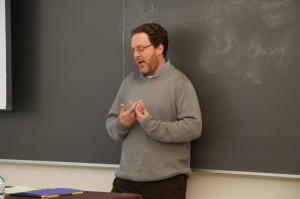People’s own expectations of government during natural disasters shapes the kind of response they receive and feel they deserve. However, in many countries, due to low government expectations, minimal and poor natural disaster aid is considered a government success.

Analyzing government responses to natural disasters, based on its citizens own government expectations, Hillel David Soifer, assistant professor of political science at Temple University, illustrated to students divergent government expectations of Latin American countries at the College’s Politics Forum on Thursday, Feb. 27.
“It’s really interesting, Latin America, because it’s the most unequal region in the world — highest level of inequality in the world, but there’s lots of democracies,” Soifer said. “These democracies are a way to keep the international community ‘off your back.’”
People’s expectations of their country’s government affect politics greatly, according to Soifer.
“Expectations affect how people act collectively,” Soifer said. “Not just their individual attitudes about government.”
Soifer discussed four examples of natural disasters in different Latin American countries: Chile’s Chaitèn volcano eruption in 2000, Mexico’s Mexico City earthquake in 1985, Colombia’s Armenia earthquake in 1999 and Peru’s El Niño flood in 1998. The government’s response to the crisis, how people evaluated that response and how politics of the response played over time were, were three key points of Soifer’s lecture.
In southern Chile, lava and ash from a volcanic eruption covered the adjacent town’s river and buildings, ultimately creating an unlivable environment. However, due to a 24-hour notice and government-issued evacuation of the town, only one person suffering from a heart attack was killed.
The Chilean government issued $1,000 and a monthly allowance to the townspeople, while additionally issuing each family $25,000 to resettle in another town. This money was more than a yearly average income, according to Soifer. New institutions, buildings and infrastructure were also created in a location agreed upon by the townspeople.
However, regardless of the government’s total intervention, the townspeople were not pleased. According to Chilean polls shown by Soifer, 63 percent of the people thought the government intervention was “adequate,” while 24 percent thought it was “insufficient.”
The townspeople protested in front of television cameras, holding the Argentinian flag.
“They were so upset with the Chilean government,” Soifer said. “This is a dramatic thing to say.”
Even though government intervention was strong, Chilean’s high expectations were not met.
The Mexico City earthquake affected tens of millions of people and killed 25,000 of them. The Mexican government, after much pressure from its citizens, bought every damaged building, tore it down and built a new one. Since citizens did not want to leave their neighbors, the Mexican government arranged the housing placements to keep the same sense of community.
Within 18 months, the government built 48,000 housing units, according to Soifer.
“I’d be stunned if this much building happened in New Orleans in 18 months,” he said.
Yet, the citizens of Mexico City had high expectations of their government and were not happy.
“They felt like ‘nobody was there to help us,’” Soifer said. “The citizens felt that the government response was confused and ineffective.”
Following these two examples, Soifer’s analysis of Colombia was “very different and a lot sadder.” Columbia’s Armenia earthquake led to 1,200 deaths and a large economic downfall, largely because Armenia is a key coffee-producing region, according to Soifer.
“The government response was an absolute disaster,” Soifer said. “Hundreds (of people) died weeks after because they couldn’t control people looting.”
According to Soifer, Red Cross trucks were driven away from towns by shooter looters. It took three weeks for the government to create a consensus about which towns were affected by the earthquake.
The government set aside $300 million, divided the regions affected by the earthquake, and said to various aid organizations, “here’s your budget, fix it,” according to Soifer. The president held a cabinet meeting in the effect region and then left, Soifer said.
Despite the seemingly weak government intervention, in a poll, 32 percent of Colombians said the government response was “excellent” and 41 percent said it was “pretty good.”
“That’s what people expect from their government,” Soifer said of the polls. “They have low expectations.”
“It was interesting to compare countries and the varying levels of response,” freshman political science major Katherine Wallentine said. “Especially in (countries like) Peru because of the manipulation. People didn’t know what was going on.”
According to Soifer, in order for people to demand high expectations from their government, they have to decide whether living in a democracy or dictatorship is significant.
“We don’t think about natural disasters in political science,” Soifer said. “But I think we should.”






